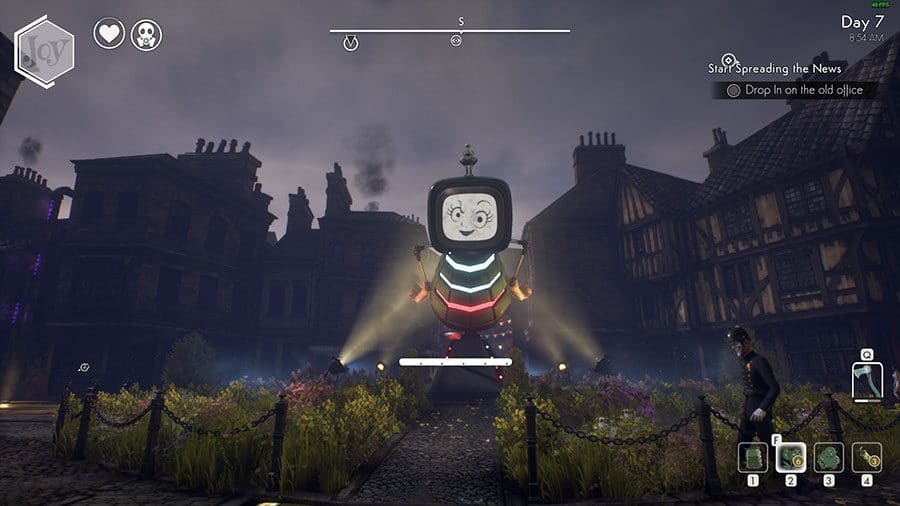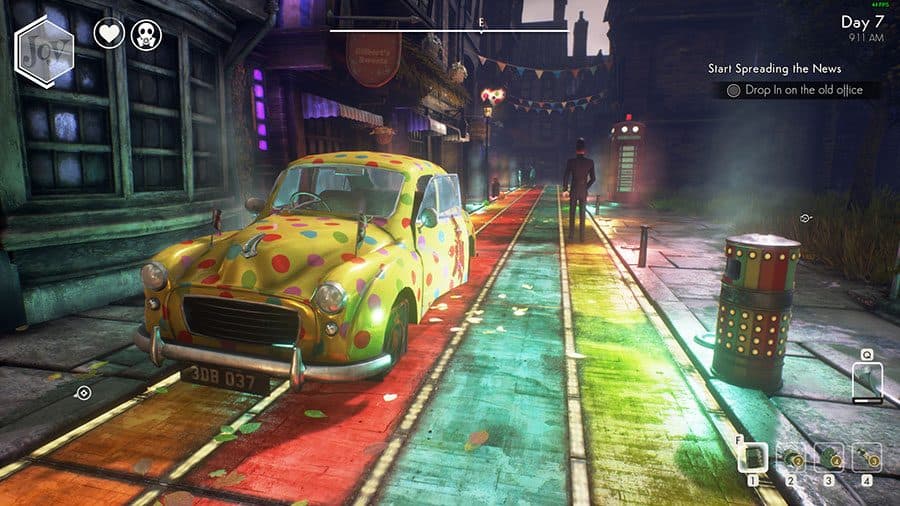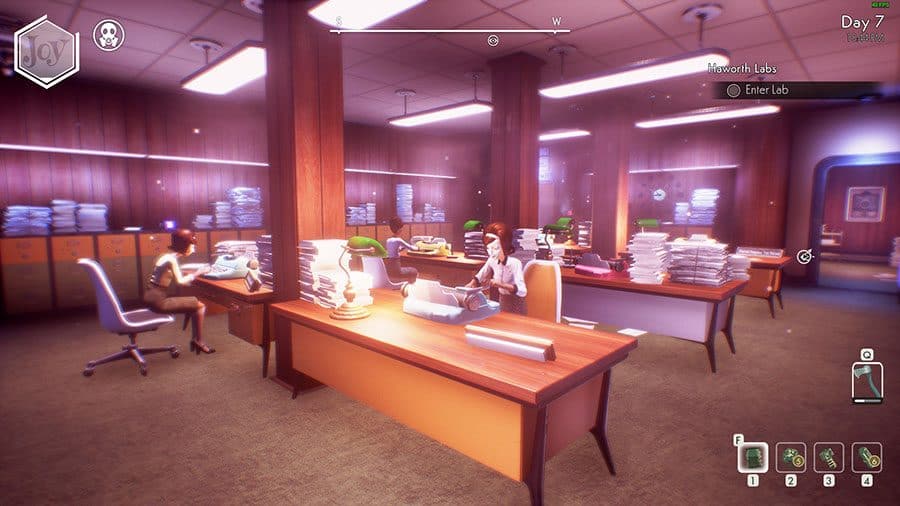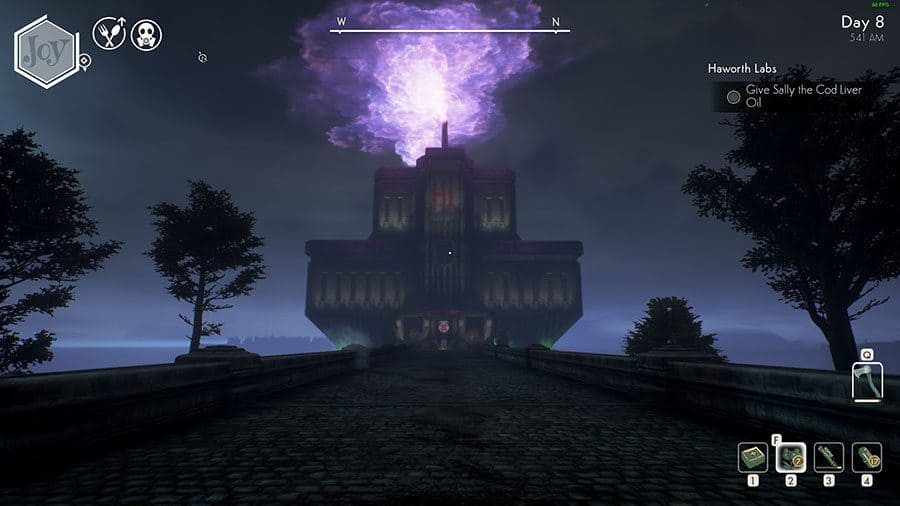We Happy Few Review – Happy Is The Game With No Past

Official Score
Overall - 60%
60%
If you can see past the casually designed mechanics and truly immerse yourself in the environment and narrative aspects of We Happy Few, there's plenty to see here. Unfortunately for those probing a more wholesome experience, We Happy Few falls short.
We Happy Few has suffered many controversies since it was first publicly revealed at PAX East in 2015. Since that time, we’ve seen an extended Early Access period and a huge overhaul of the games narrative and progressive design. Is We Happy Few worth enjoying for the game it has become, or has the change in direction lost its charm along the way?
We Happy Few Review
[line style=’solid’ top=’10’ bottom=’10’ width=’100%’ height=’1′ color=’blue’]We Happy Few takes place in the wake of World War II, an alternative timeline that saw the birth of a new German Empire that invades and occupies Great Britain. What follows is a series of cataclysmic events that the general populace would rather soon forget…and forget they will. Faced with the consequences of their actions, the citizens of Wellington Wells opt to invite euphoria back into their lives through the use of Joy, a psychedelic drug that suppresses negative emotions and with enough use, completely eradicates emotional memories. A society that is unable to feel guilt, remorse, or regret; what could go wrong?

We Happy Few offers an interesting narrative that challenges the player to think and consider each step of the way. With the continued growth in social media and online presence for the individual, it’s becoming increasingly difficult to see through the veil, the adorned window that hides behind it an abode of mess and secrets. As seemingly minuscule specs in an ever growing society, we’ve donned masks, hiding our true selves and only revealing to the world what we’re able to create in our desired image. This is the main concept that We Happy Few explores. A civilization based on eradicating individuality and encouraging conformity, with each cog of the wheel only dreaming to forget the past and embrace normality. That’s if normality was spending your days high as a kite, working on becoming as malleable as possible for the powers at be to mold as they wish.
While the survival elements and general gameplay aspects of We Happy Few failed to really impress, it was never something I focused too heavily on. Throughout the story on each of the available characters, I often found myself lost in thought as I realized how strange and depraved society could become, if only that strange depravity was encouraged, and considered the norm. It wasn’t all too dissimilar to the thought provoking Purge, forcing those that experienced it into a labyrinth of choices and questions surrounding ones moral standing once the pressures of conforming to social expectations fell away.
If nothing else, We Happy Few offers a darkly humorous take on an intriguing alternative history timeline with enough substance and some great quality voice-acting to be worth a look, but I couldn’t help feel all of it would have been much better suited to the big screen.

Sadly however it doesn’t offer a whole lot more. Much of We Happy Few’s brilliance is lost in a sea of dated mechanics and character-lacking procedural generation. The survival mechanics follow the traditional food, water, and sleep, although these can change slightly between characters to offer a little variety. While avoiding any of these important stats completely is ill-advised, it doesn’t appear to cause any serious harm outside of some painful debuffs. My initial few hours were spent hurriedly searching the fields for anything I could eat that wouldn’t give me food poisoning, before quickly realizing the futility of it all as no sooner had I eaten my fill, was I hungry for more. I’d occasionally grab the odd cake from a table or steal someones cup of tea but the survival mechanics feel more optional than required. While it subtracts from any of the challenging elements of a traditional survival system, it’s also a welcomed change that it doesn’t take the forefront of the entire experience.
It’s no secret that We Happy Few has gone through a bit of an identity crisis throughout Early Access. What was originally designed to be a short but highly replayable sequence has evolved into a much longer, narrative-driven experience, but not every system embraced that new direction. The procedural generation, while offering a good amount of replay value and a never-the-same experience twice kind of vibe, it doesn’t allow for the level of character and detailed required to help drive the narrative home. Coupled with a rather useless user-interface, I lost many hours running down identical looking streets following a floating objective icon in the distance only to hit a dead end in the same alley I’d visited in another area an hour before.

We Happy Few’s island environments seldom offer anything worthwhile off the beaten track, barring a few side missions and unique crafting opportunities. Combat works with the dated swing and block mechanics of yesteryear and while the crafting system is robust and varied, it too can be overlooked or ignored for practically the entirety of the game.
At the end of my 25-30 hour experience, I found myself unable to identity We Happy Few’s true genre. It boasts an immersive and thought-provoking story line with deep characters and interesting interactions, but at the same time it suffers with a mix of mundane game mechanics that wouldn’t feel out of place in a freshly released Early Access game on Steam.

If you can see past the casually designed mechanics and truly immerse yourself in the environment and narrative aspects of We Happy Few, there’s plenty to see here. Unfortunately for those probing a more wholesome experience, We Happy Few falls short.
UPDATE: A member of the development team posted on Reddit that there is an option in-game to entirely remove the survival mechanics.
[infobox style=’success’ static=’1′]This We Happy Few review was done on the PC. A code was provided.[/infobox]